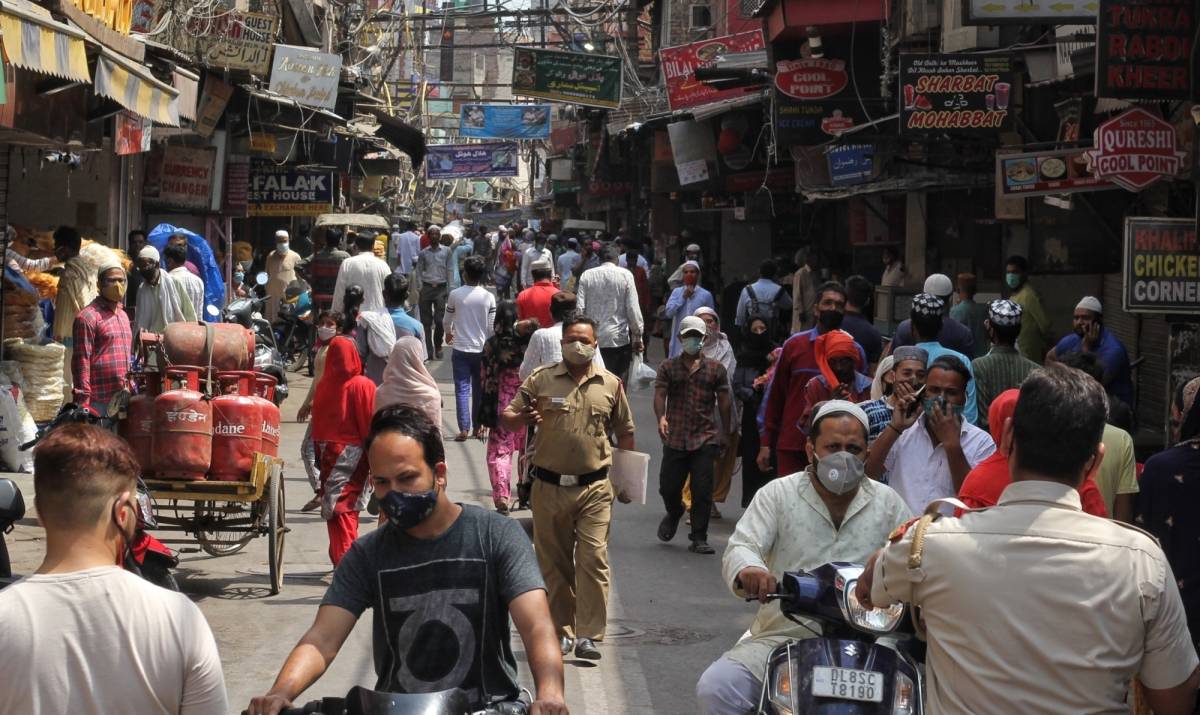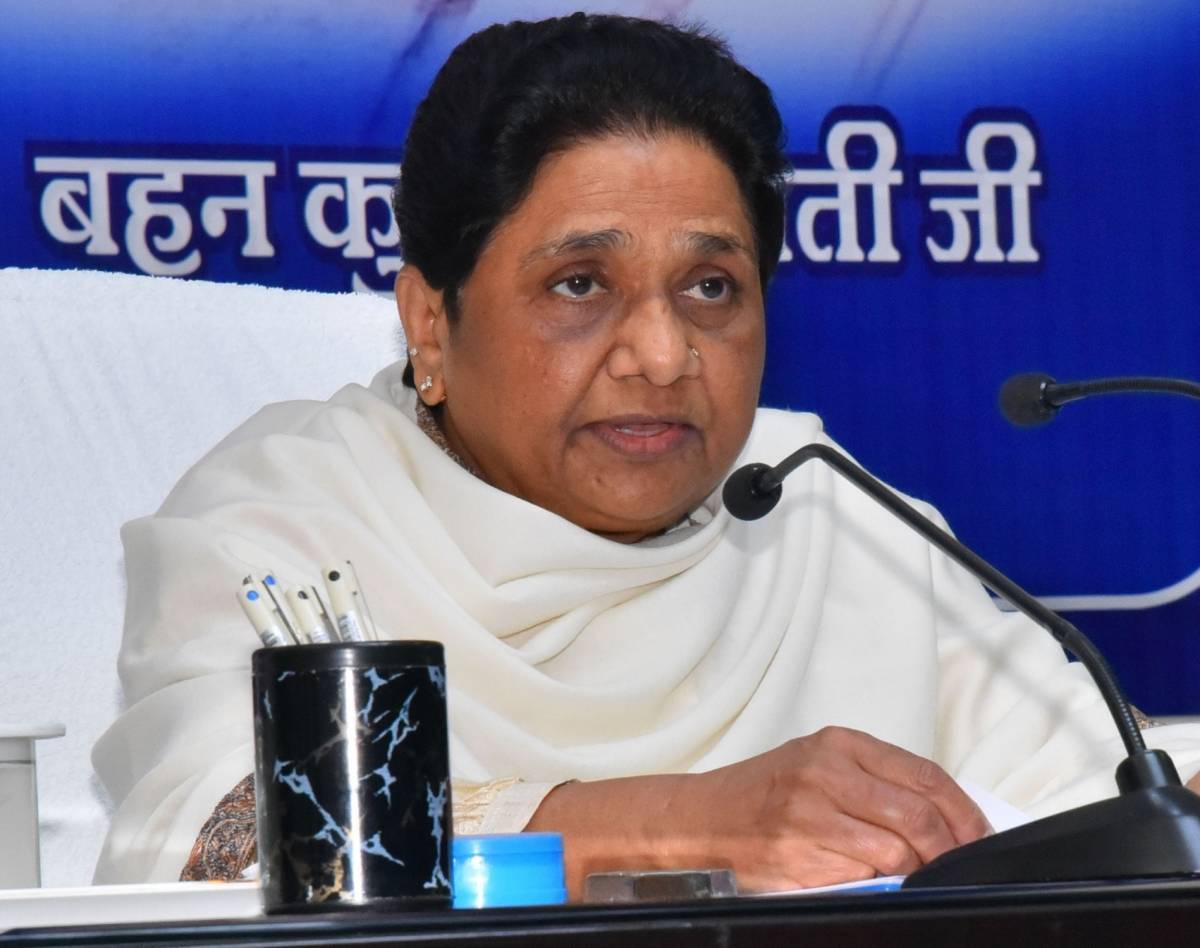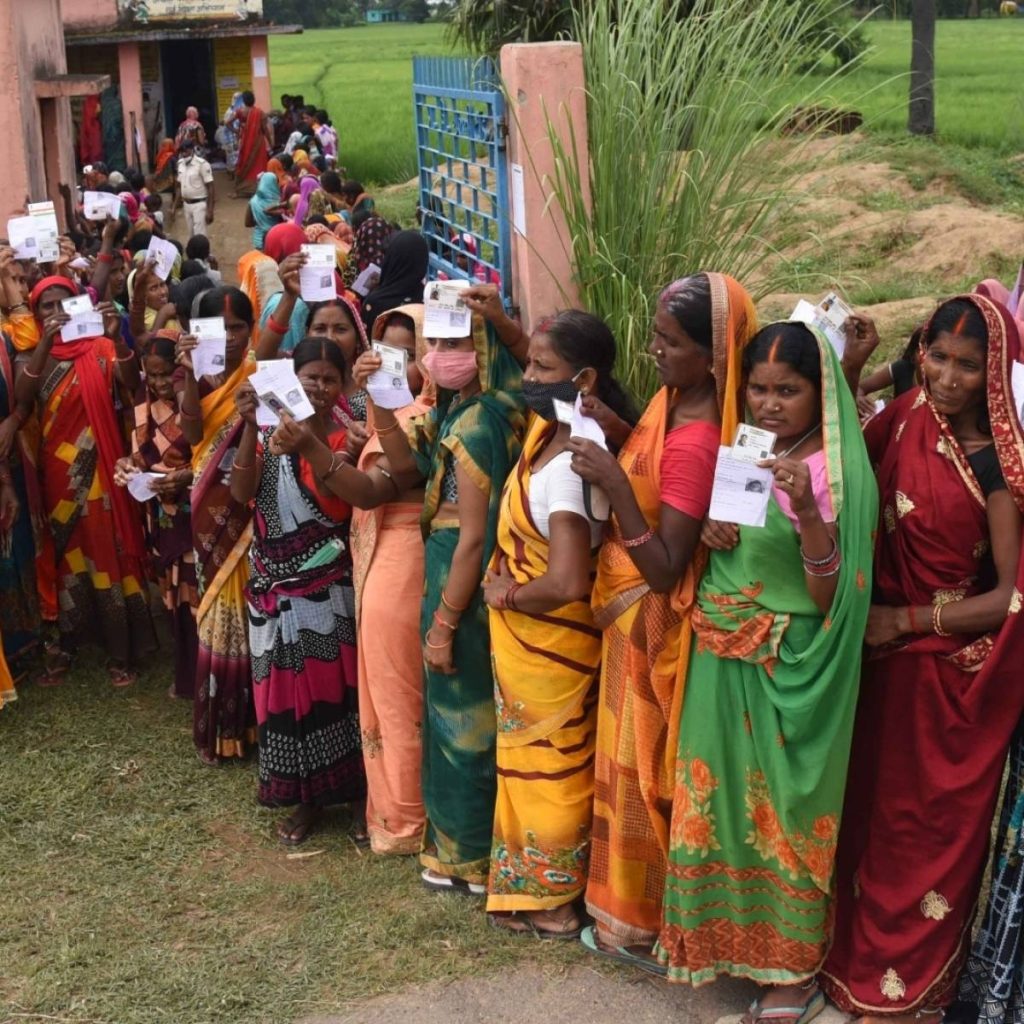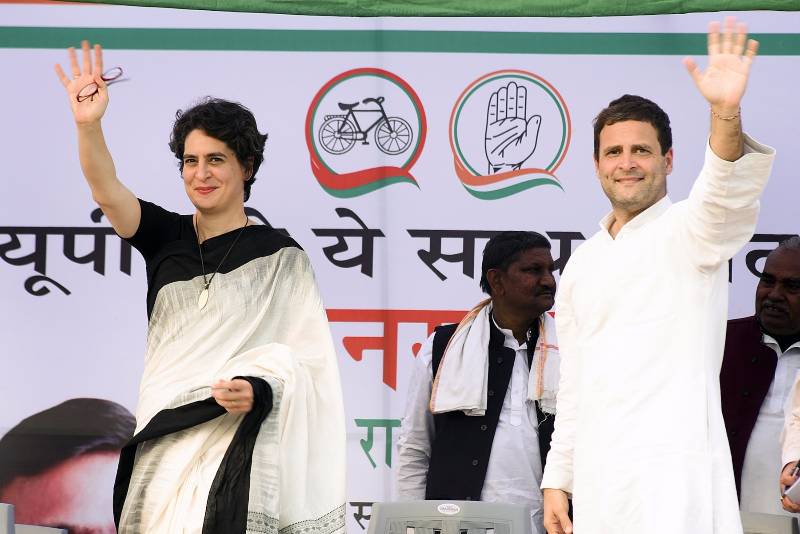Fearing polarisation on religious line, most political parties are also not talking about the Muslim factor, and the Muslims, themselves, prefer to remain low-key because they are aware that any ‘appeasement’ issue may actually prove detrimental to their interest, writes Amita Verma
Their silence, this time, is deafening and even unnerving. Muslim voters in Uttar Pradesh remain tight-lipped even as the political cauldron boils over with vote bank politics.
Talk to any Muslim on the street and the reply about the political prospects is non-committal and even ambiguous.
Fearing polarisation on religious line, most political parties are also not talking about the Muslim factor, and the Muslims, themselves, prefer to remain low-key because they are aware that any ‘appeasement’ issue may actually prove detrimental to their interest.
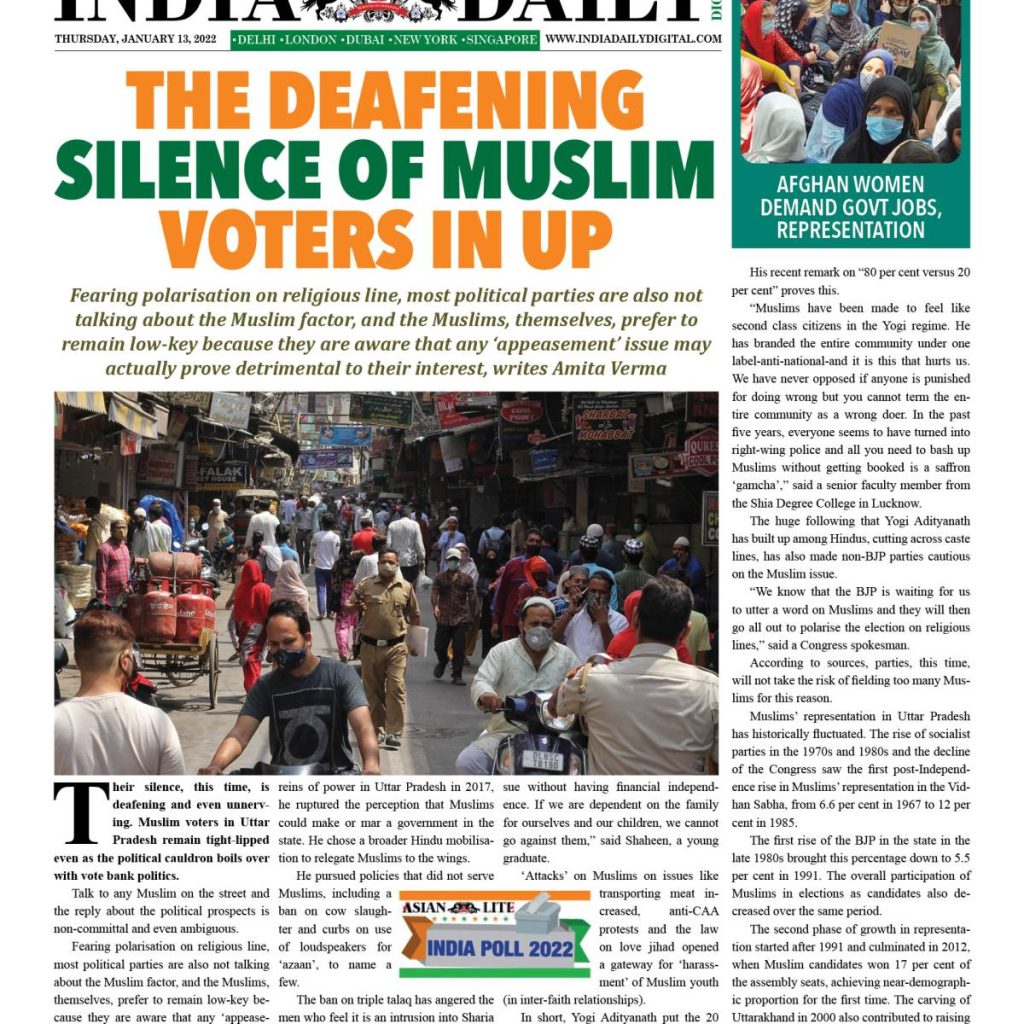
When Yogi Adityanath took over the reins of power in Uttar Pradesh in 2017, he ruptured the perception that Muslims could make or mar a government in the state. He chose a broader Hindu mobilisation to relegate Muslims to the wings.
He pursued policies that did not serve Muslims, including a ban on cow slaughter and curbs on use of loudspeakers for ‘azaan’, to name a few.
The ban on triple talaq has angered the men who feel it is an intrusion into Sharia laws. The women, though happy, feel that the law has not served its purpose.
“How can we take on men on this issue without having financial independence. If we are dependent on the family for ourselves and our children, we cannot go against them,” said Shaheen, a young graduate.
‘Attacks’ on Muslims on issues like transporting meat increased, anti-CAA protests and the law on love jihad opened a gateway for ‘harassment’ of Muslim youth (in inter-faith relationships).
In short, Yogi Adityanath put the 20 per cent Muslims on the ‘defensive’ and proved that power could be attained and retained without the minority community.
His recent remark on “80 per cent versus 20 per cent” proves this.
“Muslims have been made to feel like second class citizens in the Yogi regime. He has branded the entire community under one label-anti-national-and it is this that hurts us. We have never opposed if anyone is punished for doing wrong but you cannot term the entire community as a wrong doer. In the past five years, everyone seems to have turned into right-wing police and all you need to bash up Muslims without getting booked is a saffron ‘gamcha’,” said a senior faculty member from the Shia Degree College in Lucknow.
The huge following that Yogi Adityanath has built up among Hindus, cutting across caste lines, has also made non-BJP parties cautious on the Muslim issue.

“We know that the BJP is waiting for us to utter a word on Muslims and they will then go all out to polarise the election on religious lines,” said a Congress spokesman.
According to sources, parties, this time, will not take the risk of fielding too many Muslims for this reason.
Muslims’ representation in Uttar Pradesh has historically fluctuated. The rise of socialist parties in the 1970s and 1980s and the decline of the Congress saw the first post-Independence rise in Muslims’ representation in the Vidhan Sabha, from 6.6 per cent in 1967 to 12 per cent in 1985.
The first rise of the BJP in the state in the late 1980s brought this percentage down to 5.5 per cent in 1991.
The overall participation of Muslims in elections as candidates also decreased over the same period.
The second phase of growth in representation started after 1991 and culminated in 2012, when Muslim candidates won 17 per cent of the assembly seats, achieving near-demographic proportion for the first time. The carving of Uttarakhand in 2000 also contributed to raising the percentage of Muslim’s representation in Uttar Pradesh.
The BJP’s emphatic victory in 2017 reversed this trend back to the 1991 level — 23 Muslims were elected, against 68 in the previous polls.
This reflects the marginalisation of the community in policy-making.
“It’s not only about numbers, the slide in the community’s representation also means almost no role for it in policy-making, which does not augur well for almost one-fifth of the state’s population,” said Maulana Khalid Rashid Firangi Mahali, member, All India Muslim Personal Law Board.
As the election process begins, Muslims in Uttar Pradesh do not want to make any ‘mistake’ that will lead to a division in their votes.
How the community will ensure that their votes are not divided, appears unclear to them also at this stage.
“Defeating the BJP is a major factor though other factors also matter such as the candidate, the party, village-level dynamics and local rivalries,” said a senior cleric of Darul Uloom Deoband, adding that “had all Muslims voted for one strong party, the BJP would not have come to power in 2017”.
“The Yogi government has targeted Muslims like never before. From Azam Khan to Mukhtar Ansari, the government shown unmatched zeal in bringing them down. Others with similar offences were not even touched with a barge pole in this regime,” said a Muslim MLA who requested anonymity.
Mohd Azam Khan may have been an unpopular figure due to his brusque behaviour but the 86 plus cases slapped on him by the Yogi government and the two years he has spent in jail, have ensured sympathy for him in his community.
Similarly, the action taken against mafia don and politician Mukhtar Ansari, who has a Robinhood image in the community, has also upset Muslims.
“In these five years, the government has repeatedly flashed images of his properties being bulldozed. If he had illegally acquired his properties, the government should have waited for the court to decide. The government has worked as illegally as, perhaps, Mukhtar did. He is a five term MLA – having won three elections from behind the bars,” said Abdul Ikhlaq, a high court lawyer.
The Muslim community has been banking on tactical voting. Most political observers believe the community will wait till the last moment before voting for the strongest candidate to defeat the BJP. Tactical voting could become even more pronounced in this election.
The presence of Asaddudin Owaisi’s AIMIM in the Assembly elections, however, does not seem to be a major factor in swaying Muslim votes since the majority in the minority feels that Owaisi is not in a position to challenge the BJP yet.
There are 143 seats in Uttar Pradesh, where there is an impact of Muslim voters.
There are about 70 seats where the Muslim population is between 20 to 30 per cent and 43 seats where the Muslim population is more than 30 per cent.
There are 36 seats in UP where Muslim candidates can win on their own whereas there are 107 assembly seats where Muslim voters can decide victory or defeat.
Rampur, Farrukhabad and Bijnor are the areas where Muslim population is around 40 per cent. Apart from this, there are many such seats in western Uttar Pradesh, Rohilkhand and eastern Uttar Pradesh, where Muslim votes influence the election results.
At the same time, there are nine such seats in western Uttar Pradesh, where Muslim voters decide the fate of candidates by votes. In these nine seats, the number of Muslim voters is about 55 per cent.
These nine seats include Meerut Sadar, Rampur Sadar, Sambhal, Moradabad Rural and Kundarki, Amroha Nagar, Dhaulana, Behat of Saharanpur and Saharanpur Dehat.
Rampur has the highest 50.57 per cent Muslim population.
The Akhilesh Yadav-led Samajwadi Party won nearly half of the 57 Muslim-dominated seats in Uttar Pradesh during the 2012 Assembly elections.
In 2017, the BJP put up a dominating performance in constituencies with a sizeable Muslim population and clinched as many as 37 of these seats.
The Samajwadi Party’s share came down to just 17 while the Mayawati-led Bahujan Samaj Party failed to retain even a single seat in 2017.
ALSO READ-Congress gives 50 tickets to women in UP
